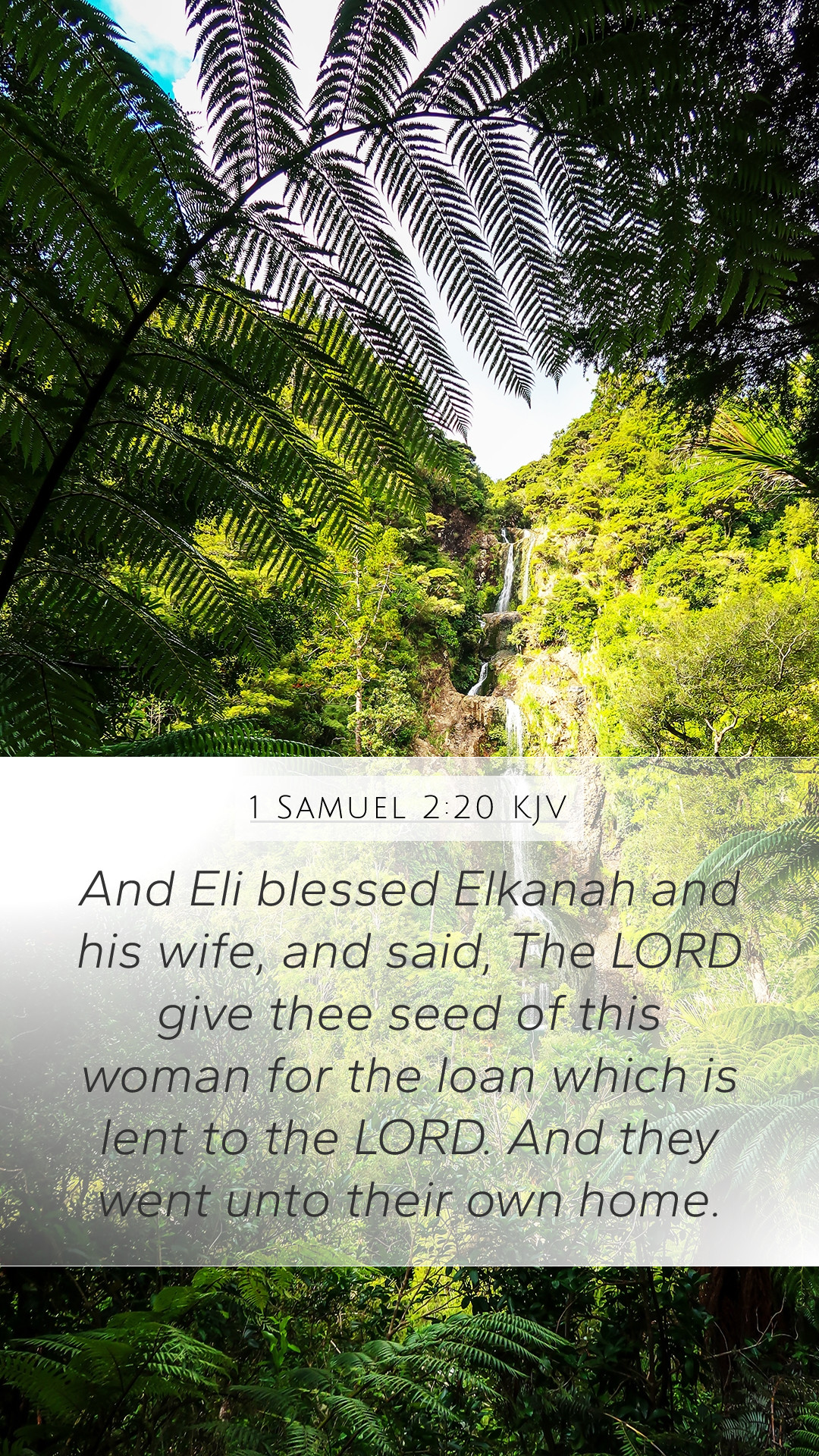Bible Verse Explanation: 1 Samuel 2:20
Bible Verse: "And Eli blessed Elkanah and his wife, and said, The LORD give thee seed of this woman for the loan which is lent to the LORD. And they went unto their own home." (1 Samuel 2:20, KJV)
Overview
This passage occurs in the context of Hannah’s dedication of her son Samuel to the Lord’s service. The narrative emphasizes the significance of divine blessings, the faithfulness of God, and the importance of fulfilling vows made to God.
Bible Verse Meanings
- Divine Blessing: Eli's blessing to Elkanah and Hannah serves as a powerful reminder of God’s providence and faithfulness in granting children to those who are barren.
- Loan to the Lord: The phrase "loan which is lent to the LORD" indicates that Hannah sees Samuel as a dedicated offering to God, illustrating the concept of dedicating one's children and resources to divine purposes.
- Restoration and Hope: This verse reflects a theme of hope and restoration within the larger narrative of 1 Samuel, representing God’s ability to intervene in personal distress and societal needs.
Bible Verse Interpretations
In exploring the interpretations of this verse, several key points emerge:
- Historical Context: Eli, as the high priest, represents the intermediaries through whom God’s grace is communicated. His blessing signifies divine sanction for Hannah and Elkanah’s dedication of Samuel.
- Covenantal Themes: The act of lending Samuel to the Lord underlines Israel's covenant with God, highlighting the seriousness of commitments made within this framework.
- God's Favor: The blessing can be viewed as a prophetic foreshadowing, indicating God’s favor towards Samuel, who would grow to be a key prophet in Israel.
Understanding Scripture: Theological Insights
This passage encapsulates essential theological themes:
- The Nature of Vows: It emphasizes the importance of following through on vows made to God, representing a deeper understanding of one’s relationship with the divine.
- God’s Sovereignty: It illustrates God’s sovereign control over fertility and destiny, assuring Hannah that her faithfulness will be met with divine blessing.
- Community Recognition: The public nature of Eli’s blessing emphasizes the community's role in recognizing and supporting the commitments made to God.
Bible Verse Commentary
Commentators provide diverse insights into 1 Samuel 2:20:
- Matthew Henry: He notes the joy of Hannah and Elkanah in receiving God’s favor and their expression of gratitude through the dedication of Samuel.
- Albert Barnes: Barnes accentuates the cultural and religious significance of Eli’s blessing, portraying it as a pivotal moment affirming both Hannah’s faith and God’s blessings.
- Adam Clarke: Clarke emphasizes the sacrificial nature of Hannah’s vow, spotlighting the importance of dedication to God and the implications for spiritual growth.
Bible Study Insights
For those undertaking Bible study, this verse provides profound insights:
- Application to Daily Life: It urges believers to consider how they dedicate their resources and children to the Lord, and how this dedication impacts their relationship with God.
- Encouragement in Prayer: Hannah’s experience encourages believers to persist in prayer and trust God’s timing in fulfilling His promises.
- Group Study Discussion: This verse can stimulate discussions in Bible study groups about blessings, commitments, and the nature of God's relationships with His people.
Conclusion
The significance of 1 Samuel 2:20 extends beyond mere historical narrative. It serves as a compelling reminder of God’s faithfulness, the importance of oaths, and the joy of divine blessing in response to diligence and spiritual commitment. For those seeking to dive deeper into Bible verse meanings, this verse stands as a testament to the richness found within Scripture.
Cross References
- 1 Samuel 1:11 - Hannah’s vow to dedicate Samuel.
- Psalm 127:3 - The blessing of children as an inheritance from the Lord.
- Judges 13:8 - Manoah’s prayer for a child and the divine response.
- Genesis 30:22-23 - God remembering Rachel and granting her a son.
- Luke 2:22 - The dedication of Jesus at the temple, paralleling Hannah’s dedication of Samuel.


